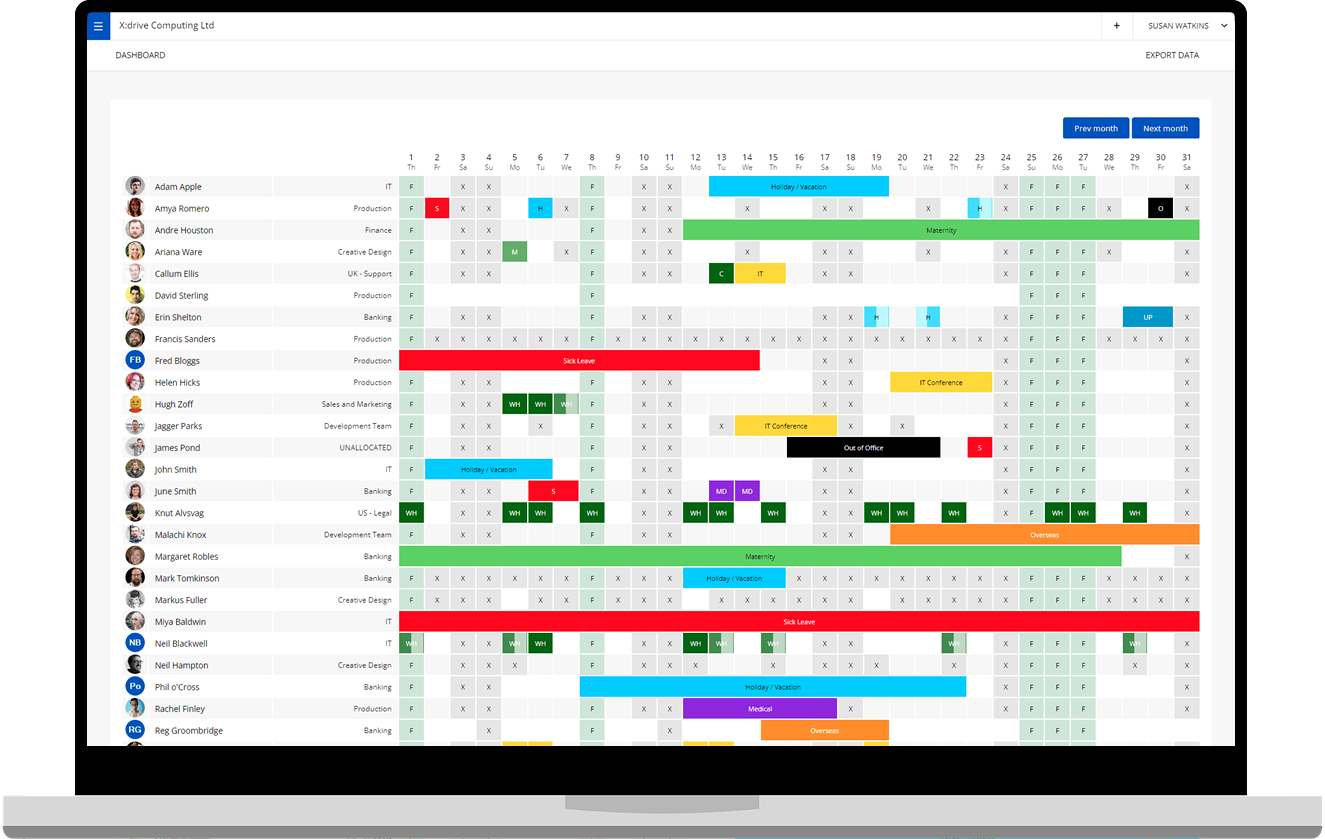When you’re launching a business, naturally the focus is on creating plans and growing your customer base. Which means HR tasks like managing annual leave slip to the bottom of the pile.
But as your company grows, formalising staff processes becomes more and more important – starting with your annual leave policy.
An annual leave policy is a formal company document outlining basic information about staff holiday, such as how much paid time off staff are entitled to each year, and whether they can carry unused leave over to the next year.
Managing staff holiday is much simpler if everyone has a set of guidelines to stick to. If you’ve never had an annual leave policy in place before, WhosOff is here to help you create a suitable framework for coordinating time off requests.
Are annual leave policies a legal requirement in the UK?
While there are statutory entitlements for employee holiday in the UK – companies must provide a minimum of 5.6 weeks’ paid annual leave per year, according to government guidelines – there is no legal requirement to record this information in an annual leave policy.
In certain industries, however, there are standard practices around how and when holiday should be used. For example, many regulated financial institutions (such as banks and broker-dealers) require staff to take a two-week block of time off each year, as part of their fraud prevention policy.
Although a company holiday policy isn’t a legal requirement, many firms find that lack of documentation leads to a lot of questions around staff leave, or trouble managing time off. This is why they choose to create and share an annual leave policy.
What should your annual leave policy include?
You can add as much detail as you want to your company’s annual leave policy, and you may wish to update it on a regular basis to make sure every detail regarding time off is covered.
Here are a few basic points your document can include:
- When your holiday year starts and ends
- How much paid holiday each staff member is entitled to – and whether that allowance includes public holidays
- Any mandatory office shutdowns that your workforce will need to cover using their annual leave (for example, the time between Christmas and New Year)
- How to book time off – and how much notice staff must give you if they want to book a day or week’s leave
- Which team members need to sign off leave requests
- Whether unused annual leave can be carried over to the next holiday year
- Protocols for types of leave other than holiday – for example, sick leave, compassionate leave, maternity/paternity/adoption leave and time off in lieu
- What happens to employees’ annual leave entitlement if they hand in their notice

What are the benefits of formalising annual leave?
First and foremost, if you write your holiday policy down in black and white, everyone in your business knows where they stand. There’s no room for discrepancies; your whole team understands both what they’re entitled to and what’s expected of them when booking time off.
Creating an annual leave policy also allows you to manage procedures around booking time off. For example, you can set a minimum notice period for requesting holiday, so your managers aren’t flooded with last minute holiday forms. You can also detail who needs to sign off each holiday request, so there’s a clear protocol for approval.
Another benefit to having a company holiday policy is that you can establish guidelines around who’s allowed to be off at the same time, to limit the chance of staffing shortages. This can be an overall number of people in the company, or based on skills/seniority – for example, two directors cannot book the same annual leave.
You can also use your annual leave policy as an incentive to encourage employee loyalty. Some companies add an extra day to people’s holiday pot for every year of service. Or you might want to offer long service bonuses – for instance, an extra week off on employees’ five-year anniversaries, and/or an extra fortnight every ten years.
Are there any downsides to launching an annual leave policy?
Writing a company holiday policy can fall to HR teams or managers with HR responsibilities in their role. This can be quite daunting for anyone who’s never written a formal document before, but there are plenty of free annual leave policy templates online that you can use as a basic structure.
You also need to make sure that annual leave protocols are shared widely with the team, so that everyone knows what your guidelines are – including new starters who join once the holiday policy is in place.
How can companies put holiday policies into practice?
Many businesses find that creating a paid leave policy is quite simple; the challenging part is making sure that everyone in the team follows your protocols.
One way to make leave management much simpler is to invest in an online company holiday planner. Digital tools like WhosOff have been purpose-built to help you put policies into practice, for example:
- Setting individual holiday entitlements for each employee, so you can factor-in long service benefits, or any unused leave being carried over year-to-year
- Streamlining approval processes, so e-requests are sent to whoever needs to sign them off, and approved leave is added directly to the online holiday calendar
- Allowing view-only access to the holiday calendar and each team member’s own record, so people can see how much leave they’ve got left and who has already booked time off before making a request
- Updating each employee’s holiday allowance once they’ve booked time off, for an accurate record of exactly how much remains in their entitlement
- Creating rules around who can book the same days off, so any requests that contradict company policy can be identified and turned down to prevent staffing shortages or skills gaps

Download WhosOff’s free company holiday policy template to formalise your annual leave process. And book your free WhosOff trial to start managing staff holiday online.
Similar articles
27.FEB.2026
Sick leave is one of the biggest hidden costs in any organisation — but only if you’re tracking it the hard way.
Modern teams are moving away from spreadsheets and email chains and adopting structured tools that make absence management clearer, fairer, and far more efficient. WhosOff is leading that shift, with features built specifically for accurate, compliant sick leave tracking.
04.DEC.2025
It’s the season of giving, and we’ve got some gifts for you — fresh updates to WhosOff that make managing leave faster, smarter, and easier than ever.
From brand-new security options to a complete re-write of the WhosOff calendar (yes, it’s lightning fast!), these changes are designed to save you time and keep your team running smoothly.
02.DEC.2025
Preparing holiday allowances now sets your business up for a smoother, more productive 2026. Tools like the WhosOff Holiday Calculator make it easy to get the numbers right — and ensure your team feels valued and supported.
11.NOV.2025
Thinking of your Christmas list? How about what you really need to help run your business? WhosOff will be sitting at the top of business lists for Christmas, here's why
